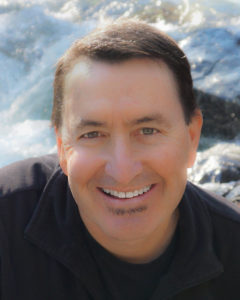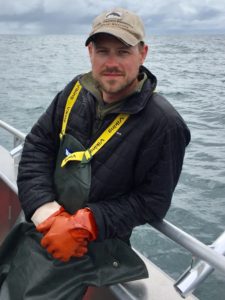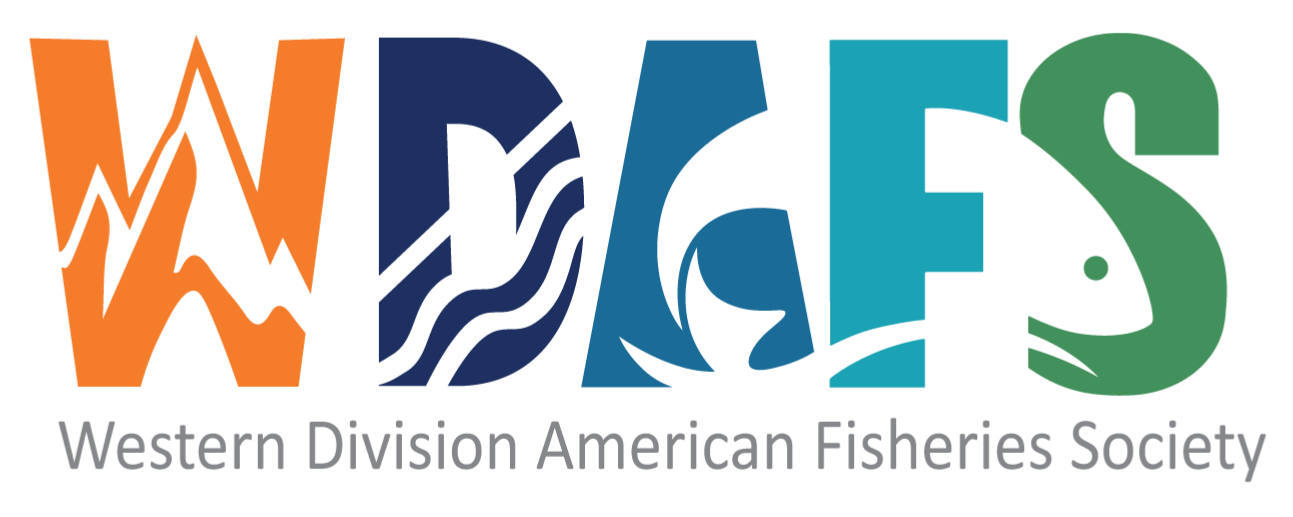From April 1 to April 30, Western Division members will be able to vote electronically for one of two Vice President candidates. Tony Siniscal and Todd Pearsons have thrown their hat in the ring; both have carved out successful fisheries careers, and both are highly motivated and capable leaders. No matter who wins the election, WDAFS will be well-served. Their candidate statement can be found below.
To vote, please visit: 2018 Officer Election
Todd Pearsons, Ph.D.

Background
I have always loved water and what lives in it. I grew up in California swimming, surfing, angling, snorkeling, spearfishing, and SCUBA diving. As a kid, I watched Jacques Cousteau and his team bring images from below the water surface into my home. I was hooked and I knew I wanted to spend my life working in and around water.
I prepared myself for an uncertain career in the aquatic profession by going to the University of California at Santa Barbara and getting a degree in Aquatic Biology with a heavy emphasis on surfing – go Gauchos. I did laboratory and field work to understand the influence of sea urchins on kelp bed communities including diving with torpedo rays at night while netting and tagging surf perch underwater. I also harvested mussels from offshore oceanic oil rigs to help pay the bills.
I furthered my aquatic preparatory education by traveling north to graduate school at Oregon State University, where I earned my M.S. and Ph.D. in Fisheries Science – go Beavers. While I studied in Oregon, I had the privilege of working with great people such as the brilliant Douglas Markle and “discovering” a new species of fish and petitioning to have the Oregon Chub added to the Endangered Species list (which later became the first fish to be delisted as a result of recovery). After my work on the wet side of the state I began working on the factors that influence stream fish communities in eastern Oregon. With felt-soled basketball shoes, knee pads and masks I joined with the creative Hiram Li’s scrappy crew crawling up shallow streams in the John Day Basin and counting every fish we saw and examined the data to determine factors (e.g., habitat complexity, predation, flooding, cattle grazing, and temperature) that could be responsible for the variation we observed. Those were some of the best summers of my life.
After an initial contact during an AFS meeting in Texas, I landed a job with the predecessor to the Washington State Department of Fish and Wildlife (WDFW) in 1992 and moved north to Central Washington to work out my dream job. I led science teams that evaluated hatchery programs and studied hatchery and wild fish interactions for much of my tenure at WDFW. I also had the opportunity to represent the United States as a delegate in talks with Russia about interactions and salmon conservation, developed risk management approaches, and co-developed a nutrient restoration tool called the carcass analog. In 2008, I began working with Grant County Public Utility District as a means of contributing to the challenge of balancing power generation and natural resource stewardship. Species reintroductions, restoration, and harvest augmentation have been some of the key thrusts of my job. One of the biggest tests in my current job was working with others to pass all of the migratory fishes in the entire upper Columbia River that could have been blocked as a result of a fracture in a mainstem Columbia River Dam (Fisheries 41(11):622-629).
Along the way, I have had opportunities to serve at a variety of Universities (e.g., University of Washington, Central Washington University, and University of Haifa), author or co-author over 170 publications, speak around the world, consult on important natural resource issues, and work with great folks. I have also enjoyed work as a professional underwater photographer as a means to increase awareness about the underwater beauty in fresh waters (see recent interview in Fisheries and the Todd Pearsons gallery at www.underwaterfishphotos.com).
AFS Involvement
I became an AFS member in 1986 and later became a life-member because of the compelling mission of the organization. I also obtained my professional certification through AFS. I have attempted to further the mission of AFS by organizing and chairing many symposia at chapter and national AFS meetings, presenting many talks at AFS conferences throughout the country, publishing articles in most of the AFS journals, serving as a reviewer for many AFS journals, consulting on national AFS issues, serving on committees, recruiting new members, and contributing photographs to AFS publications.
My hope is to further advance the mission of AFS through serving as Vice President and ultimately President of the Western Division. My involvement in AFS for over 30 years, my experience in a diversity of natural resource issues, and leadership experience in a variety of professional and non-profit organizations has prepared me to serve AFS in a greater capacity than I have in the past.
If elected, I would vigorously seek to improve natural resource stewardship for the benefit of current and future generations. I would endeavor to build upon our great meetings by increasing participation, opportunity, and influence. Some strategies to achieve this include: 1) adding more communication formats such as debate, video, interview, and demonstration, 2) adding important training opportunities such as negotiation, communication, and conflict management, and 3) leveraging the influence of our annual meetings by creating captivating evening sessions that could be attended by the public. I would also seek to improve the influence of AFS professionals through methods such as: 1) developing linkages between broader societal values such as physical health, water use, economy, and world view and the expertise of AFS members, 2) building upon transboundary and ecotone issues through intentional collaborations among AFS members in the United States, Canada, and Mexico (e.g., Columbia River Treaty, estuaries, riparian zones), 3) improving the interaction and communication of science and policy, 4) forming teams of experts to provide solutions to critical issues such as competing resource laws and lowering barriers to cross-cultural communications, and 5) increasing publication of innovative ideas and inspirational topics.
Thank you for taking the time to evaluate the candidates for this important election. I hope to serve you in a greater capacity in the future and advance sound science, promote professional development, and disseminate science-based fisheries information for the protection, conservation, and sustainability of fishery resources and aquatic ecosystems.
Anthony (Tony) Siniscal

Background
I remember the day when a good friend, after observing my affinity for all things aquatic, suggested that I consider a career in fish biology. My response was “You can actually do that?!” I often recall this memory when I try to explain what I do for a living to a non-fisheries person. I suspect that many of you can relate. The best name bestowed on our collective trade would be from my fiancée when we first met; while describing me to friends and family she would refer to me as a fish ranger… A Fish Ranger! Heck Yes! Protect (the resource) and serve (the fishing public). I wish I had thought of that.
While my early education and career had nothing to do aquatics or fisheries, I have always managed to find myself around water, nature, and fish wherever I have lived. My trek into the sciences began in the pre-med program at a small but formative university in upstate New York, University of Rochester (U of R). I had started out working towards a degree and career in immunology and working as a technician in a cancer research lab. Then, I took my first ecology class and realizing I had found my niche, I switched my focus the following semester to evolutionary biology and ecology. Although I continued in the medical research curriculum, I also spent time on a research project on invasive dreissenid mussels in the Finger Lakes, NY.
When it came time to apply to graduate school, I found myself at a crossroad; continue in medical research or pursue aquatic ecology. It was a tough choice. In the end, I applied to State University of New York College of Environmental Science and Forestry (SUNY ESF and yes, it is the longest college name in the country). Knowing very little about fish ecology but having some solid science and statistics under my belt I accepted a graduate position researching fish ecology in a hypereutrophic, inland lake in Syracuse, NY. After my graduate work, I was hired as project coordinator for the engineering department at SUNY ESF and gained some invaluable experience in environmental, economic, and engineering feasibility studies. After some time in a cubicle, I decided that I needed to try out my sea legs and worked as a fisheries observer in the Northern Mid-Atlantic. Spending about 18 months at sea on the Atlantic Coast I started looking to the other side of the country for the next adventure. After a few applications and interviews with Oregon Department of Fish and Wildlife (ODFW) I landed a job and finally returned to where I smolted (I was born in Oregon) in 2011. Since my return to Oregon I have been employed with ODFW working in recreational and commercial fisheries management in the lower Columbia River.
AFS Involvement
I have been a member of AFS since 2005 and have been continually involved in committees at the academic, state, division, and national levels. It was at SUNY ESF where I was introduced to the American Fisheries Society. My advisor asked if I was interested in helping to rejuvenate the SUNY ESF Chapter as participation had slumped in previous years. Knowing nothing about AFS but completely eager, I jumped in, dusted off the bylaws, and assembled a team of officers. Within a few months, we had a functioning chapter on our hands and were planning trips to NY Chapter and AFS meetings. After organizing student trips to national meetings in Lake Placid (2006), Ottawa (2008), and Nashville (2009), I knew that AFS would be a long-term synergetic component of my education and career.
After moving to Oregon in 2011, I immediately sought opportunities with the Oregon Chapter (ORAFS) and was nominated and elected as secretary/treasurer. During my 4-year tenure on the ORAFS Executive Committee, I worked to improve the financial sustainability, bolster its organizational structure, and build upon membership services of the Chapter. I co-authored position papers, internal documents, and policies, and I drafted a Financial Sustainability Plan. I was on the planning and budget teams for 3 successful Chapter meetings, a provocative hatchery vs wild salmonid symposium, and the 2015 AFS meeting in Portland, OR. During my tenure, the Oregon Chapter won the AFS Outstanding Chapter of the Year Award three years in a row.
After 4 years on the ORAFS Executive Committee, it was time to take a break. I stayed involved, though, and have served as chair of the ORAFS Financial Sustainability Committee since its inception and was nominated to the WDAFS and AFS Investment Committees in 2015.
Vision
Committees are intended to foster teamwork. AFS committees draw together people with diverse perspectives, concerns, interests, objectives, and talents to achieve shared goals and represent the membership. I believe in observing the operation of a committee, getting to know its members, and looking for ways that my perspectives and proficiencies can be most helpful. I would not immediately offer any promise of novel committees, resolutions, or projects. Instead, I offer thoughtful leadership, levelheadedness, diplomacy, and my tireless dedication to aquatic resources, the fisheries profession, and the AFS membership.
My experience on AFS committees has imparted a few key principles: remember the mission, develop and enhance governing documents, strive for long-term financial sustainability, leave a legacy, and represent the diverse interests of the membership. The AFS mission statement is multifaceted; we are here to enhance not only a natural resource but also the science and scientists that support it. Governing documents are critical to the efficiency and efficacy of an organizations leadership; handbooks, guidance documents, and policies should be augmented or created so that we are not recreating wheels after passing the torch. Enduring financial sustainability is critically important; even non-profits must think about making and saving money so that that they can continue to do good things. Leave a legacy; in the spirit of my U of R motto, Meliora-Ever Better, I think is important to add something demonstrable to the foundation of the organization so that it will continue to grow. Finally, consider the diverse disciplines and values of the membership; we run the full gamut of disciplines, from geneticists, fisheries managers, biometricians, ichthyologists, hatchery biologists, and population ecologists (etc. etc.). I believe we need to foster relationships and understanding between disciplines while pursing the AFS mission.
I am honored by this nomination for Vice-President of the Western Division of AFS. I hope that you will give me yet another opportunity to contribute to AFS.

